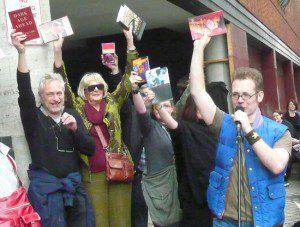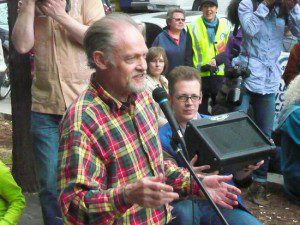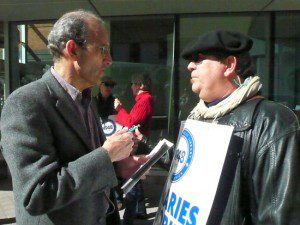
Towards the end of last Sunday’s Books ‘n’ Brunch event, staged by Shelley Macbeth and her Blue Heron Books staff, I turned to the audience. I had been interviewing successful crime writer, Giles Blunt, author of six books featuring fictitious Canadian detective John Cardinal. Having asked all my questions, I invited some from the audience. One of the first questions came from a librarian from Sandford. The second came from a former librarian in town. It occurred to me that in a room of about hundred avid readers, a goodly number of those in attendance had served in the libraries of local schools and branches of our public library.
When author Blunt later commented on the quality of the audience’s questions, I pointed out how arts focused and well read this community is.
“We’ve got something like 25 or 30 book clubs here,” I told him. “And it’s probably no surprise that at the heart of those clubs are current or former librarians.”
Blunt, a long-time Toronto resident, who admitted he “rarely ventured north of Dupont Street,” expressed some surprise that a small town could generate such a lively arts and literary culture. I suggested that having a proactive bookstore operator and a regularly engaged community of musicians, visual artists, writers, actors, photographers, cinematographers, producers, directors, and librarians didn’t hurt. All those artists have not only chosen to reside in the township, I said, they have also chosen to foster local arts events throughout the year. For them, having readings, plays, concerts and exhibitions in town is just as important as having youth sports, garbage pickup and snow removal.
Co-incidentally, when the Blue Heron event was over last Sunday, I drove to my next appointment. The Writers’ Union of Canada (I have been a member of this union of some 2,000 Canadian authors since 1977) had decided to express its support for Toronto Public Library workers by joining their pickets in front of the main reference library in downtown Toronto.
In the bright mid-afternoon sunshine, librarians, authors and several hundred members of the public gathered to hear some of this country’s favourite book writers. They had come to encourage the city to reach an equitable and early resolution in its contract dispute with 2,300 members of Local 4948 of the Toronto Public Library Workers Union. Among the first to speak to the demonstration was TWUC chair Greg Hollingshead.
“A library is a place to read … to find a job and to connect with the city and its services,” said the award-winning novelist and poet. “A library is a place for people to discover who they want to be.”

Other internationally published Canadian authors spoke, including Susan Swan, Ken McGoogan, Douglas Gibson and Erika Ritter. They all explained how the Toronto Public Library gives their work shelf space and exposure. They applauded the library for helping to build their followings. But they also credited the library for being the birthplace of so many of their ideas.
When I was offered an opportunity to speak, I thought about the hundreds of students I’ve instructed in journalism during the past decade at Centennial College. I recalled how often those novice journalists had begun to explore their world and their profession by tapping the physical and electronic resources of the busiest library system in the world.
“Sometimes the first and best contact my journalism students had, starting out, was a Toronto reference librarian who helped them toward their first published story,” I said. “A reliable librarian just might be a young journalist’s first and most important contact.”
Among the full-time library staff I met Sunday afternoon was Joseph Romain, who started working at the TPL in 1980. I asked him what kind of money was at stake in the contract negotiations, what the working salaries were for professional librarians these days. He said that some of the most experienced staff – some with a master’s degree and decades of experience – earned perhaps $50-60,000. He emphasized that salary was not unreasonable; but it wasn’t exorbitant either. But Romain warned that a work stoppage and stalled negotiations presented a more serious threat.

“Earlier this year they said all the attention that Margaret Atwood brought to the Toronto Library system had saved it,” he said. “Unfortunately, she couldn’t save the jobs.” He explained that after all the publicity involving the mayor and his brother died down, the city went ahead and cut staff, “when the public wasn’t looking.” Since the beginning of the year, 107 full-time library positions have been cut at TPL; since the amalgamation of the city, in 1998, 17 per cent of staff has been chopped.
The lesson learned for me on Sunday – a day exposed to the input of librarians – was never to take them for granted. They help build a community. They kindle its culture. They spark initiative and hope in its citizens.